Drama Recaps Boys Before Flowers: Episode 25 (Final) Last episode! I was pretty satisfied with this finale. It didn’t feel rushed, but it wasn’t too dragged out either — it wrapped up everything much as you’d expect, but managed to insert enough details to keep it interesting (because I was fearing that the ending would go down too predictably and therefore be lame). Oh, and you know the part that they kept saying would deviate from the Hana Yori Dango original? I LOVED IT. (First) SONG OF THE DAY Toy – “Bon Voyage” with Jo Wan-sun of Roller Coaster. [ Download ] Oh my god, this recap is so long. Sorry, guys! You are forewarned. EPISODE 25 RECAP (FINAL) Jan-di visits the hospital in the early morning, while Jun-pyo is still sleeping. She makes a joking comment trying to magic back his memory (“abra cadabra, make Gu Jun-pyo remember Geum Jan-di”), then drops off her dosirak lunchbox at his bedside. 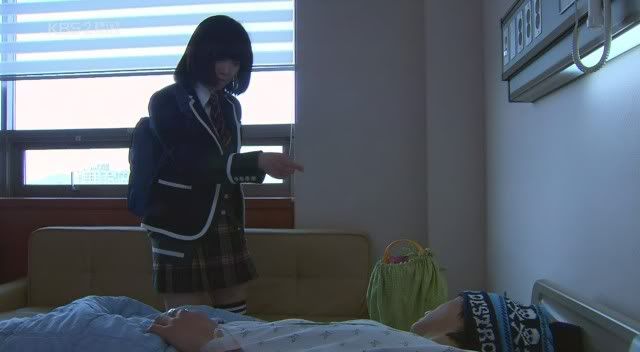 Later that morning, Yumi comes by. I want to give her the benefit of the doubt (so far she’s annoying, but not evil), but really, she’s got boundary issues to be slipping into a sleeping patient’s room and applying a skincare device to his face while he sleeps. That wakes him up. Glancing over at the side table, he wonders what the lunchbox is doing there. Yumi opens the containers, and as she pulls out the Jun-pyo Face Rice tray and the egg roll-up snacks, Jun-pyo furrows his brow, a thought niggling at the back of his mind.  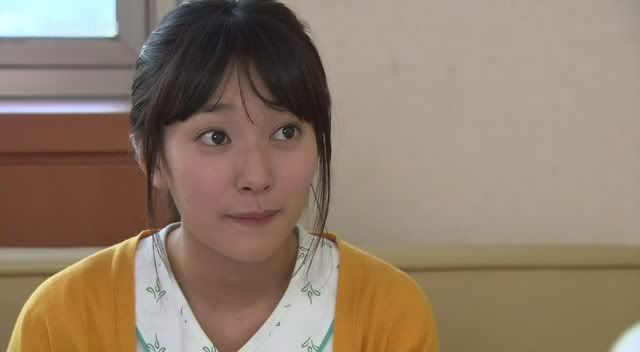 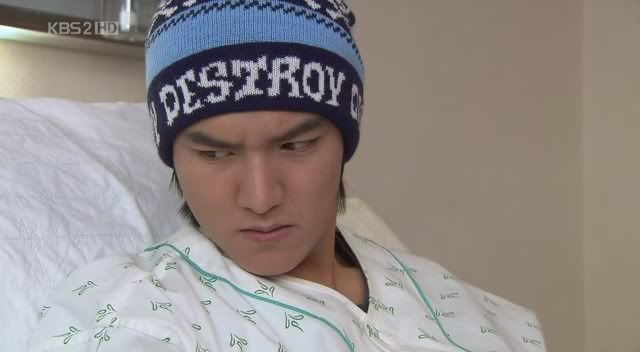 He tries one of the egg rolls, and the taste jogs his memory — it gives him a vague (good) feeling. Jun-pyo asks if she made the food, and for a brief moment Yumi hesitates, as though wondering how to answer, then nods. He says, “I remember. The thing I forgot — it was you, right?” Although you get the sense she hadn’t intended to lie at first, this is too good for her to pass up, so she goes with it. 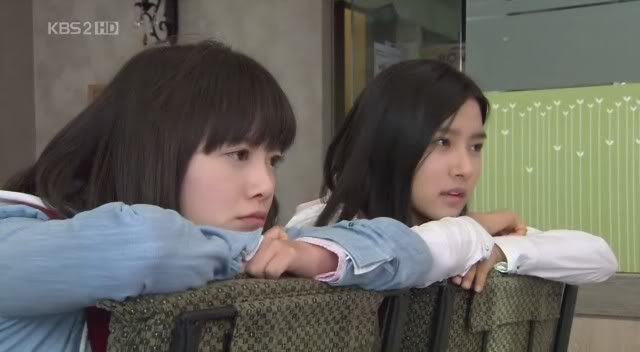 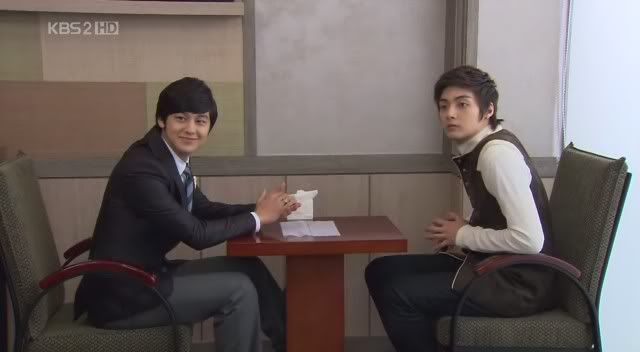 F2 arrive at the restaurant for some lunch, while the girls watch in puzzlement, wondering why they’re here. Finally, when they’re done eating, they announce the good news: Jun-pyo’s been released from the hospital. Jan-di perks up. The guys encourage her to go to him, and she rushes off excitedly. 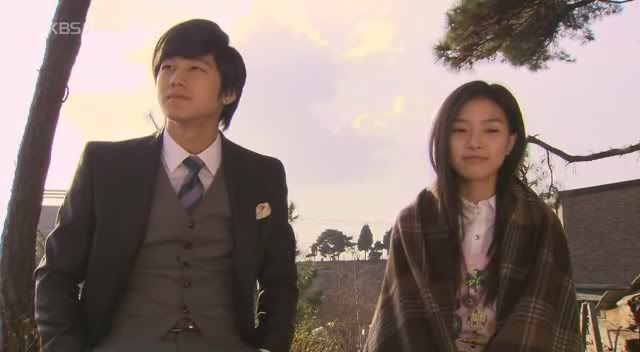 Yi-jung remains behind, because he has something to say to Ga-eul. They watch clay baking in a kiln as Ga-eul muses, “They look happy, those plates inside. For some reason, rather than thinking they’re hurting in that heat, it feels like they’re happy. They’re full of hope that if they endure this, they can come out and receive love.” Yi-jung has two things to tell her, and starts with the bad news first, the way she likes it: He’s leaving. He adds, “I guess that may not be bad news to you.” He plans to remain abroad for four or five years. 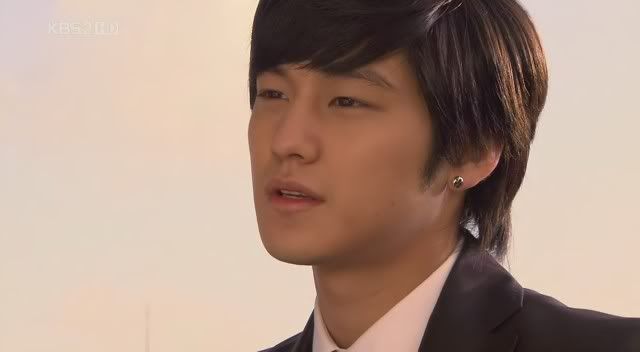 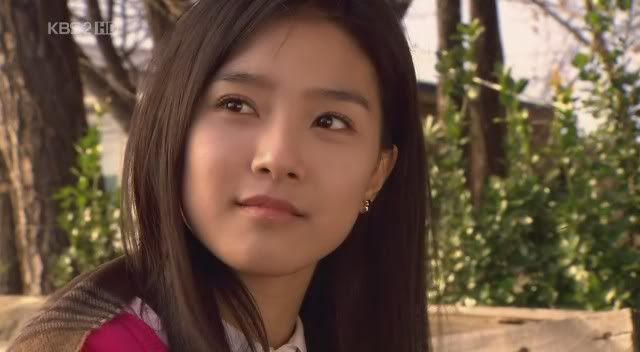 Ga-eul tries to be optimistic, saying it’s actually good news because he’ll be sure to return an even better potter. She asks for the second part, so he tells her, “When I come back, I’ll come find you first.” That’s even more startling than the first, but makes her much happier. Perhaps Yi-jung is a little uncomfortable to have opened up, because he adds, “I mean, if you can’t find your soulmate by then.” But that’s enough of a confession for Ga-eul, who breaks into a smile. 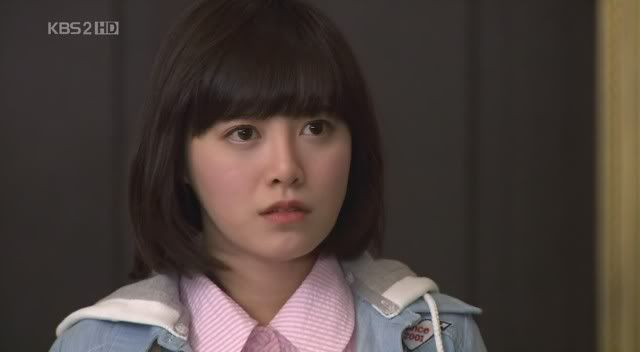 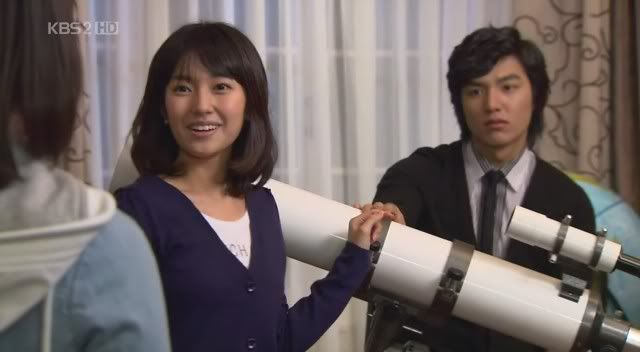 Eager to see Jun-pyo, Jan-di rushes into his room, calling out a welcome greeting, then stops short: Yumi is already there. Jun-pyo just tells her that Ji-hoo’s not here, and that she should take care of her boyfriend before rushing to check up on him. At his ungracious non-welcome, Jan-di figures this was a mistake, and turns to go. Yumi steps in to admonish Jun-pyo for being mean, and urges Jan-di to stay for tea. It’s an odd dynamic, because Yumi has usurped Jan-di’s position as hostess, and I’m not the only one who thinks she’s an upstart: the maids also direct dirty looks at Yumi. 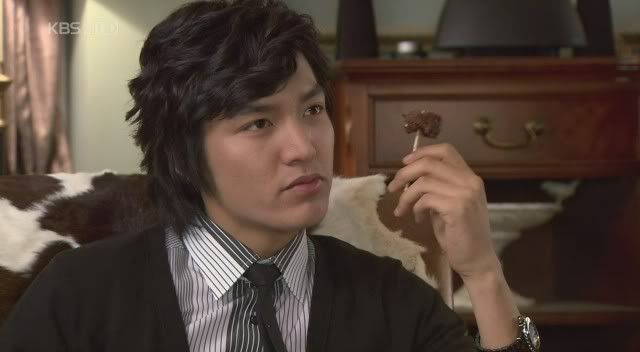 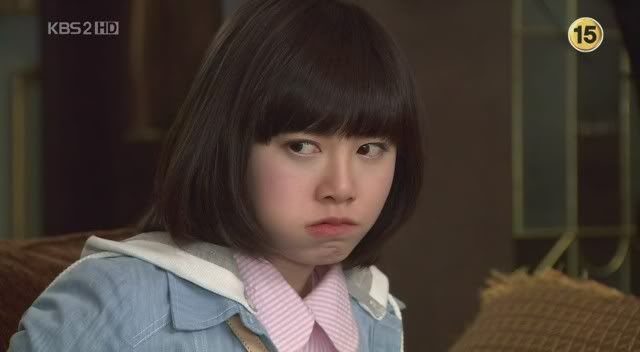 Jun-pyo acts pretty friendly and relaxed with Yumi, which is hard for Jan-di to watch, so she gets up to leave. Jun-pyo tosses out casually, “Don’t come by again.” (He doesn’t say so in a mean tone, but maybe it’s all the more hurtful that he’s so blasé about something that means so much.) He adds, “When I see you, I feel really bad. It bothers me.” Jan-di retorts, “Fine. I’m sorry! I won’t come by anymore!” 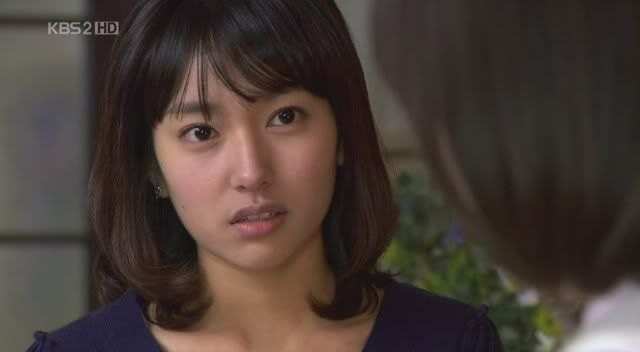 Yumi reads the tension and follows Jan-di outside to ask, “Are you the person Jun-pyo oppa is supposed to remember?” She sees that Jan-di is, and takes a tone of concern as she says, “But as you can tell, I think it’s worse for him to see you. If he sees you, I think his condition will deteriorate. So for now, I think it’ll be better if you don’t drop by. Don’t worry, I’ll do my best to bring back his memories of you naturally.” Yumi’s words are reassuring, but Jan-di is also a little doubtful; after Yumi rejoins Jun-pyo, Jan-di peers inside. Jun-pyo asks Yumi to make the lunchbox again — proof that Yumi had taken credit for her lunch, which probably means she’s lying about the rest, too. 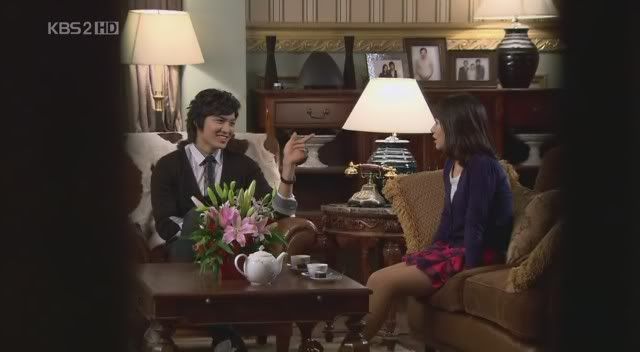  Upset, Jan-di rushes down the stairs on the way out and bumps into Ji-hoo, who tells her firmly, “Don’t run away.” Jan-di tries to escape, but Ji-hoo says, “You can’t be pushed aside like this.” Pulling Jan-di behind him, he heads for Jun-pyo’s room. Unfortunately, they find Jun-pyo and Yumi napping cozily on the couch together. 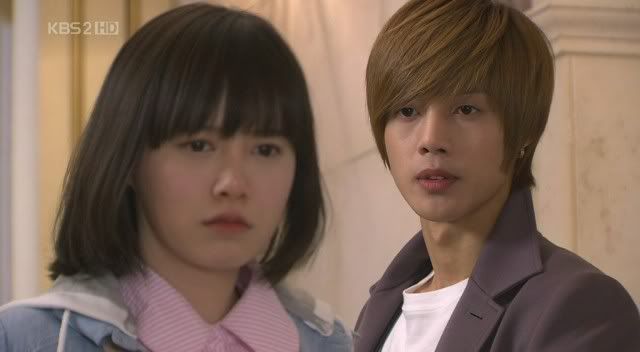 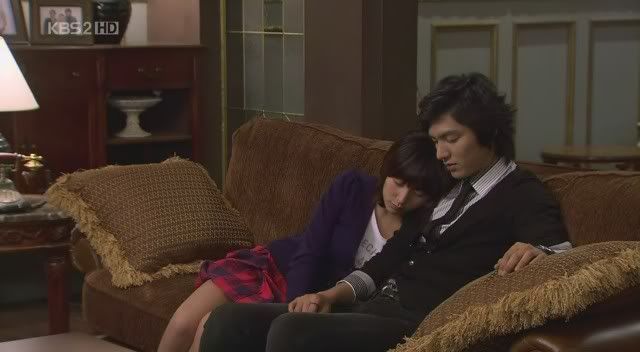 That hurts. Jan-di rebuffs Ji-hoo’s attempts to reason with her (and persuade her to fight for Jun-pyo), telling him that it’s over, she’s done: “Even if he lost his memory, even if we started over from the beginning, I had faith he would recognize me. But I was wrong.” Ji-hoo starts to protest, but Jan-di isn’t swayed: 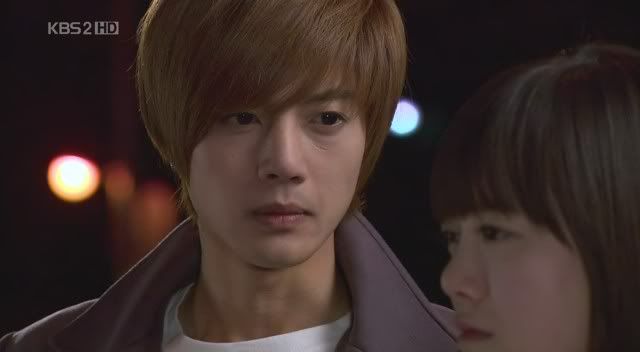 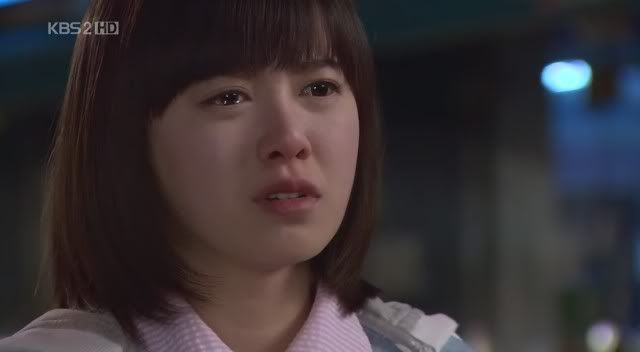 Jan-di: “No, it may be upsetting and unfair, but I have to acknowledge the truth. The Gu Jun-pyo I loved is gone now.”   Yumi presents her lunchbox to Jun-pyo, who eats an egg roll with anticipation. However, the moment he registers the taste, he frowns: “This isn’t it. The taste is different from before. Did you really make it that time?” Yumi stutters, “O-of course! Who else could have made it? That’s just because every time I make it, the taste is a little different. I’ll make it right next time.” But something’s not right, and the taste of the food just enhances his bad feeling. He says, frustrated, “That girl. That Jan-di weed girl — I can’t forget her expression.” 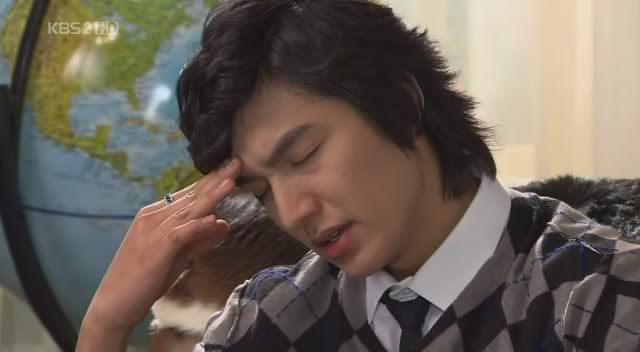 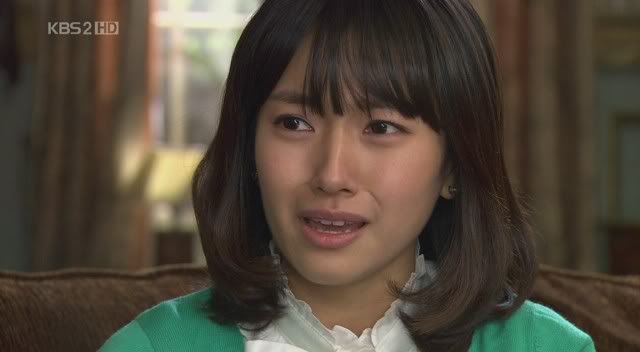 Yumi: “That’s too mean! How could you say that? I’m the one who was with you, from the hospital up till now, but you feel so bothered by a girl who just dropped by and bugged you a few times? Your friends all treat me badly and take her side, and her boyfriend totally ignores me. But still, I put up with it because of you. If you act like this too, what is Yumi supposed to do?”For us who know the truth, she’s obviously way over the line with this speech — but if she really WAS Jun-pyo’s girlfriend, I suppose this is how she would react, and she’s acting her part to the hilt. She cries, and makes Jun-pyo feel uncomfortable. 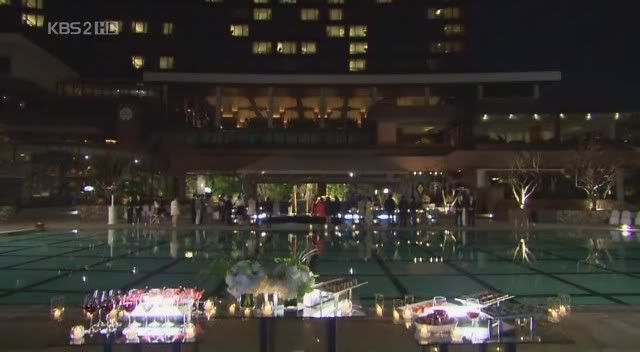 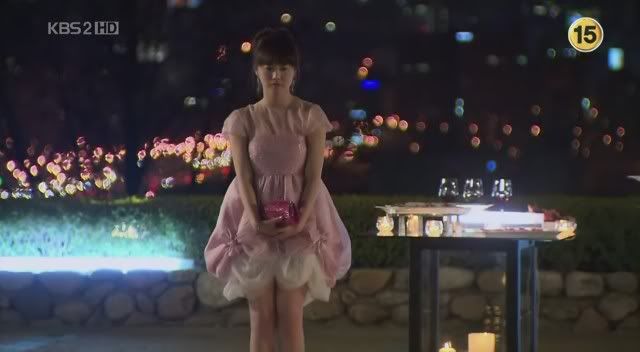 The guilt trip works, because the next thing we know, Yumi and Jun-pyo are jointly hosting a “surprise pool party.” (I’m wondering what the surprise is, if they’re handing out formal invitations.) The setting is absolutely gorgeous. In fact, this entire episode is pretty visually stunning, on the whole. Yumi wastes some screentime with a harp performance — and seriously, Mr. Jeon PD, do you really have to pay tribute to yourself (again!) by using a My Girl theme song here? 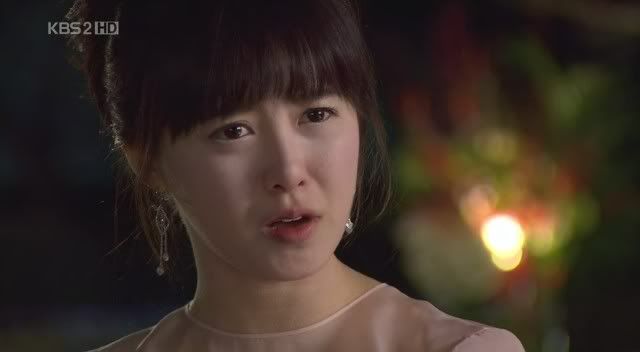 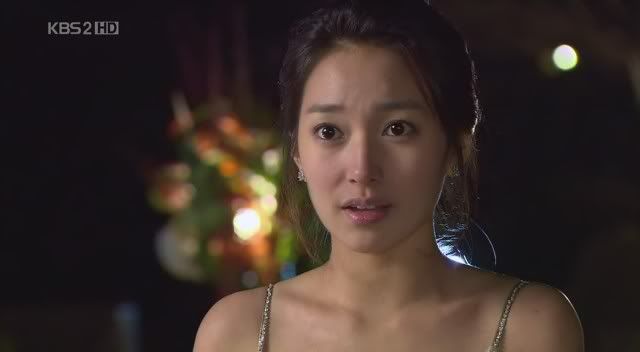 Feeling pretty low, Jan-di steps aside to be alone. Yumi finds her by the pool and keeps up the ruse that she’s been working to “help” Jan-di. She has news to report, but it’s not good: “He doesn’t remember you.” Yumi speaks obnoxiously about herself in the third person (because we don’t already hate her enough?): “I’m sorry to tell you, but Yumi likes Jun-pyo. I didn’t try to deliberately, but I ended up falling for him, so much that I can’t break up with him. Oppa feels the same as Yumi. But you can understand, can’t you? We can’t control our hearts.” 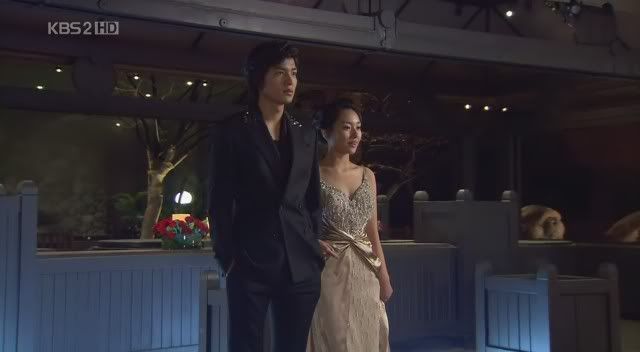 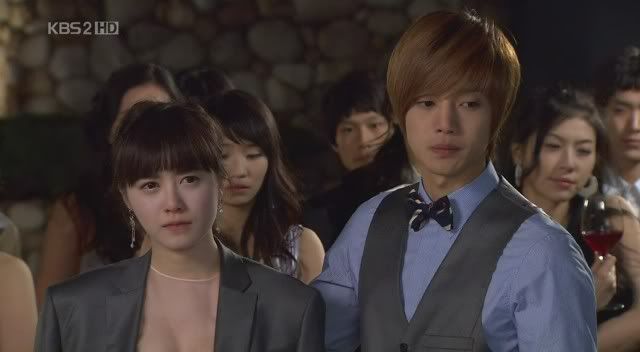 Yumi draws everyone’s attention to make a big announcement: She and Jun-pyo are going to study abroad together to the States. They will leave in one month. F3 marvel in a sort of disgusted fascination at Yumi’s fast maneuvering. Ji-hoo leads Jan-di away from the crowd to the pool, where he leaves her while for a moment to get her a drink. Alone, Jan-di takes out her star-moon necklace, just as Jun-pyo walks by. As soon as he sees her, Jun-pyo turns to leave, but Jan-di asks if he remembers the necklace she’s holding, or the names engraved on it. Jun-pyo takes a look at the “JJ” and says irritably, “How would I know that?” 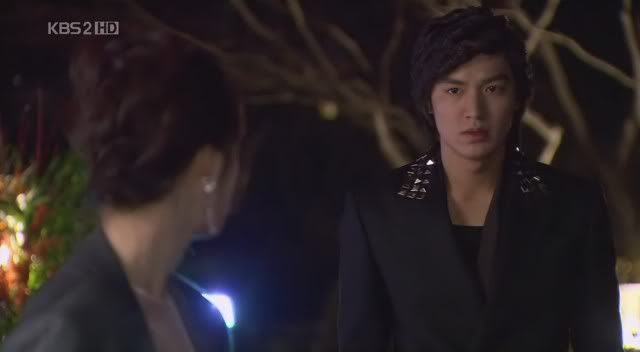 Jan-di holds it out to him: “I’m giving it back. Take it.” None of this makes sense for Jun-pyo, and he retorts, “Why would I take something like this? If you want to get rid of it, do it yourself.” He hands it back. Jan-di says, almost defiantly, “Fine.” She throws the necklace into the pool, where it settles on the bottom. But she’s not quite done: Jan-di: “Gu Jun-pyo. I’ll ask just one more thing. Do you know how to swim?” 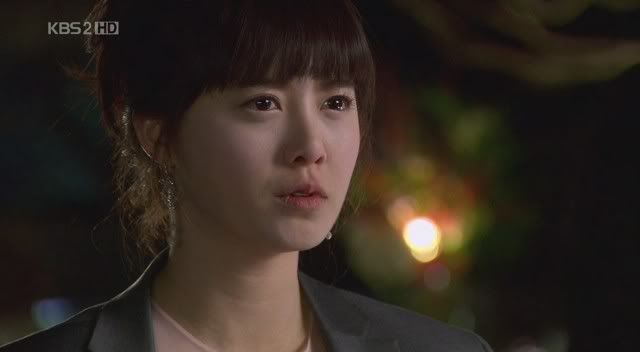 Jun-pyo bristles at the way Jan-di is talking about him so familiarly, but her words start to unnerve him, particularly as she tells him what kind of person he truly is (including a few of the sayings he’d messed up previously): Jan-di: “You’re hardly afraid of anything in this world, yet you shake in fear over a bug. You’re an idiot who thinks it’s better to get all your ribs bashed in than see one of your girl’s fingers break. You’re a dummy who can’t tell the difference between the words privacy and pride, who insists like a train that swallowed its heart that the 38th Strategy [of ancient China] is running away [it's the 36th]. You say you hate kids, but you want to be a devoted father who watches the stars with your son. You’re a lonely person with a lot of love.” 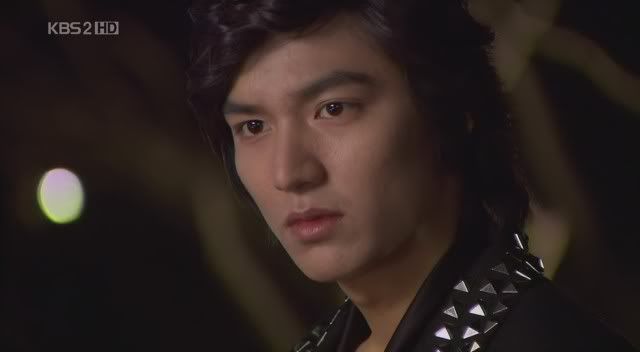 Uneasily, Jun-pyo demands, “What are you really after?” Jan-di tells him, “Say my name,” then starts to step backward, slowly, purposefully. At the edge of the pool, Jan-di pauses… and then lets herself fall backward into the pool. It’s an eerily beautiful image as she hits the water, stiff as a board. 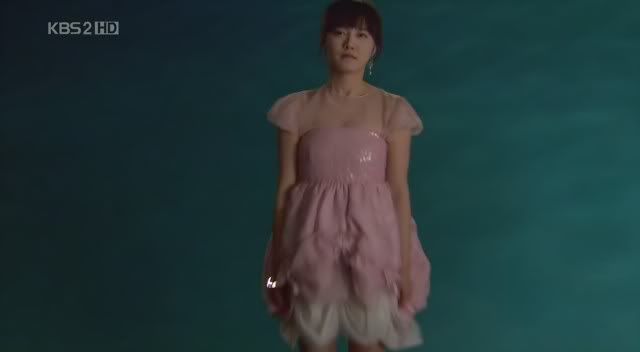 In the pool, Jan-di picks up the necklace, but doesn’t come back up to the surface. Clutching the necklace, she remains submerged. The rest of the party rushes to the water’s edge, alarmed. Jun-pyo stands frozen in shock… and then, memories come flooding back.  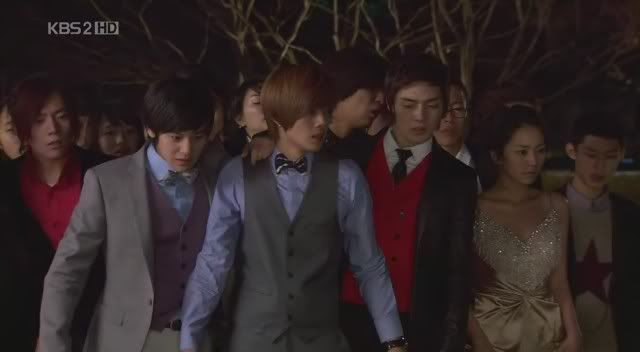 In quick succession, he flashes to all the other water-related emergencies earlier in the drama (if I didn’t love this moment so much it would be funny that they have enough of those to compile a montage). He whispers, “Jan-di.” Then, jolted out of his stupor, Jun-pyo shouts her name again, and dives in. Memory now back in full force, Jun-pyo pulls her to safety, where he tries to revive her. In a panic, he administers CPR and calls her name repeatedly, until Jan-di sputters awake. She looks up and asks weakly, “Do you remember now?” He tells her he’s sorry, and she asks him to say her name again. He clutches her to him and obliges. 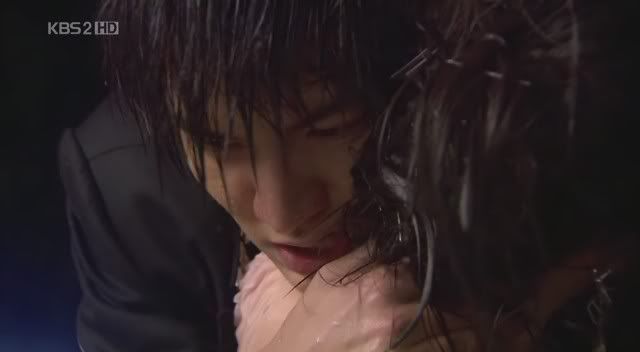 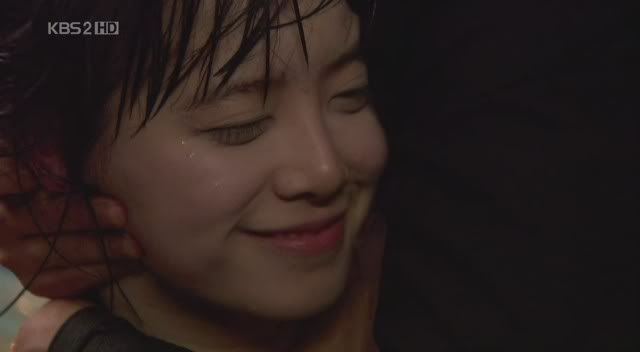 (Yumi walks off, petulant. Good riddance!) And then, it’s back to everyday life, kinda. Jan-di and her family are back at their old place in Seoul, and she’s about to graduate. She doesn’t intend on going to her graduation party, although her mother urges her to. 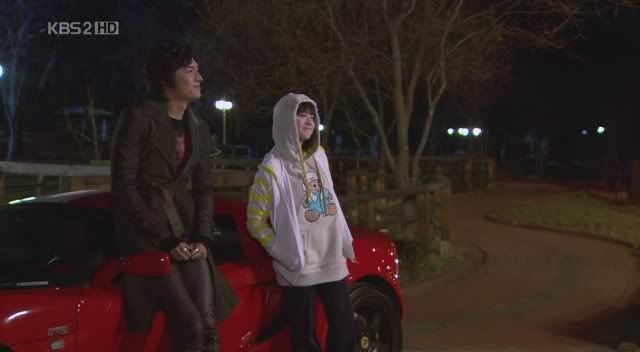 Jun-pyo calls her out to congratulate her on her upcoming graduation. He also asks if she’s really serious about medical school, teasing about how she’s not smart enough. He’s also here to request a date. Echoing an early scene, Jun-pyo traps Jan-di against his car, leans in closely, and says: “Tomorrow, ___.” 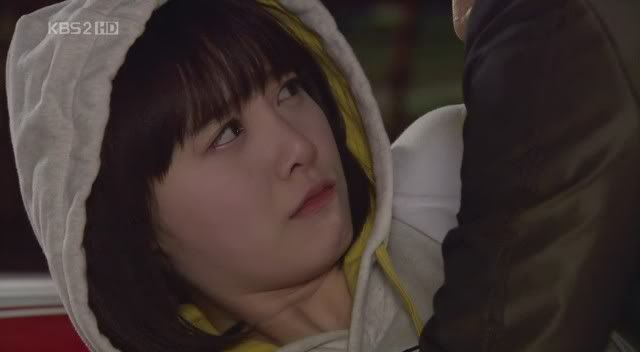 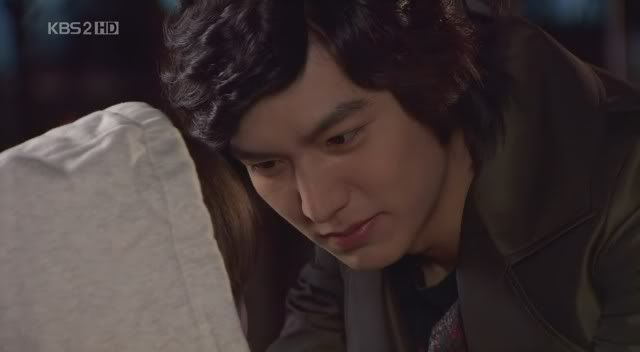 Naturally, just as he relays that crucial bit of information, a passing motorcycle drowns out his words. Jun-pyo thinks his message is clear and warns Jan-di that if she’s late this time, she’s really dead. True to her word, Jan-di doesn’t plan on showing up to her graduation party, but a stretch limo pulls up (presumably from Jun-pyo) to take her — so when she arrives at the formal party, she’s still wearing her school uniform. (Let’s ignore the horrid dancing and the familiar set, shall we?) 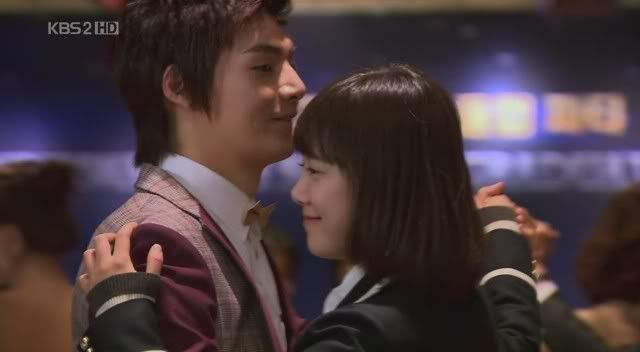 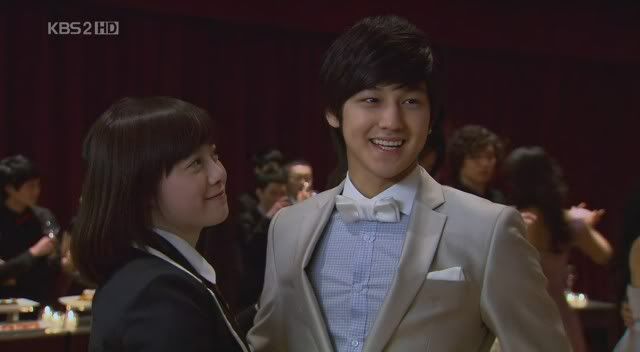 F3 greet her warmly, and Woo-bin steps up first to ask her to dance. This allows each person a send-off as each gets his moment with Jan-di. As she dances with Woo-bin, she thinks, “Song Woo-bin, he’s always reliable and caring, as though he was the eldest in F4. I know now that he understands better than anyone how to comfort a person’s feelings, while standing one step behind.” With Yi-jung, she thinks: “He acts cold and like a bad boy, but in reality he’s warm and innocent. Thanks to Yi-jung sunbae, I think Ga-eul has really become a lovable woman.” 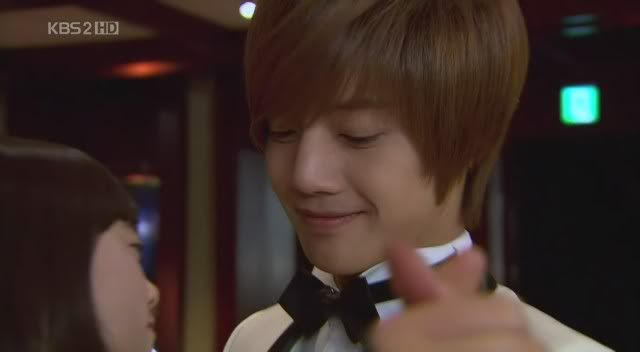 Ji-hoo’s last: “I was like Alice dropped into Wonderland. Could he know what a huge solace he was to me, that I was able to meet him whenever I went to that emergency door? He’s like a ‘bonus’ given to me from heaven. I won’t ever forget him. My soulmate Ji-hoo sunbae, thank you.”When Jun-pyo doesn’t make his appearance, the guys wonder what’s keeping him. Jan-di thinks back to his drowned-out words, and now realizes what this reminds her of — and rushes off to Namsan Tower. 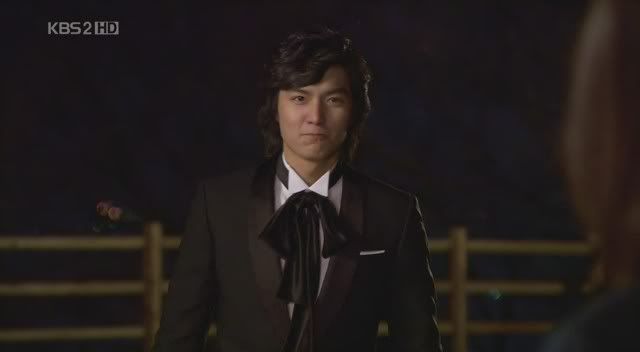 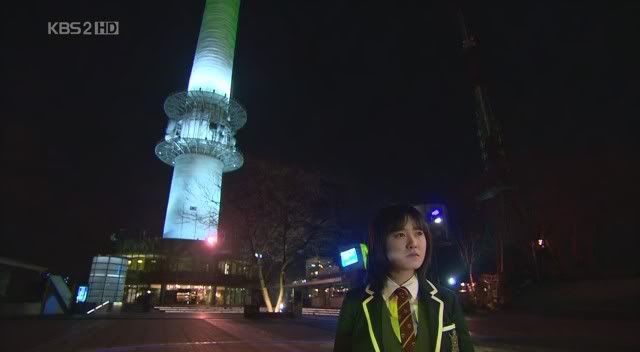 Sure enough, Jun-pyo’s waiting for her and asks, “Didn’t I say you were dead if you were late?” But he’s not upset, and with a snap of his fingers, lights fill the courtyard. Jun-pyo comments, “It’s nothing magical. Stuff like this is really easy — compared to tending to the Jan-di-baht.” (Literally, “maintaining the grass.”) Since this is a reenactment of their first date (albeit upgraded), Jun-pyo buys her coffee, then leads her to the viewing deck. In a cute moment, Jun-pyo brings her to the cable car, intending on pointing out the graffiti he’d written on their first date, but Jan-di’s embarrassed and blocks his view.   She complains, “Why’d you write this, and make it impossible for me to get married?” (This means that it makes her look promiscuous and would therefore be a stain on her character.) Jun-pyo doesn’t see the problem: “Then just marry me — who else are you thinking of marrying?” In contrast to her grimace, Jun-pyo looks at the scrawled words proudly, announcing, “Now you can’t get married.” (To anyone else.) But now it’s time for them to get down to some serious talk. Jan-di tenses nervously when Jun-pyo’s tone turns solemn: “Let’s marry.” Jan-di doesn’t know whether he’s joking — he isn’t — and is completely taken aback, since she just graduated from high school. Jun-pyo explains, “I have to go to America. This time it’s not because of my mother, or the company. I decided this.” 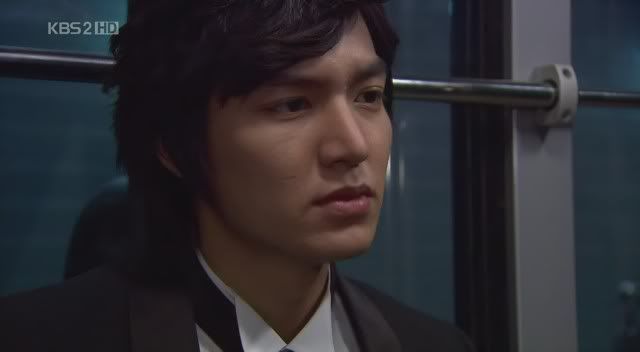 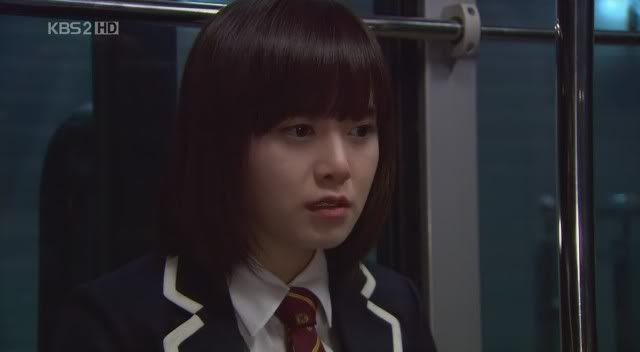 He’s decided to take his future into his own hands: “I’m going to do my best. If I can save the company, that’s good. If I can’t, I’ll shut it down with my own hands.” Jan-di’s dismayed when he says that he’ll be back in four years at best, asking, “That long?” Jun-pyo: “So come with me.” But that’s not the magic solution, and it’s Jan-di’s turn to grow (more) solemn. She can’t go with him: “When you went to Macau, I made a decision too, regarding my dream, my work, what I want to be. Like you, I have something I want to devote myself to, and it’s here.” It’s not a rejection, it’s reality butting in. Jan-di says with a hint of a smile, “Go, and come back. In four years, if you come back as a really impressive man, I’ll think about it again then.” 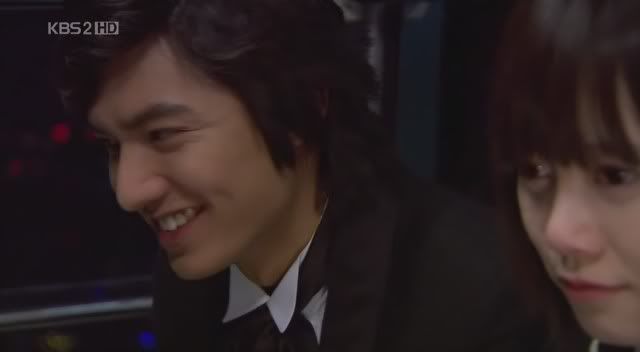 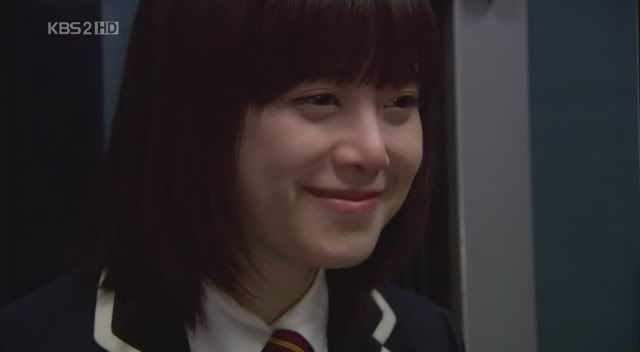 At this, the mood lightens. Maybe it’s not an ideal solution, but the compromise will work for them. Jun-pyo asks, half-jokingly, “Do you mean that? If you lose me, you’ll really regret it.” She teases back, “Hey, if you lose me, you’re the one who’ll regret it.” Jun-pyo has no problems admitting, “I know that if I lose you, I’ll regret it till I die.” Once again repeating some words she’d formerly told him, Jan-di says, “Gu Jun-pyo. You may not be a complete idiot.” 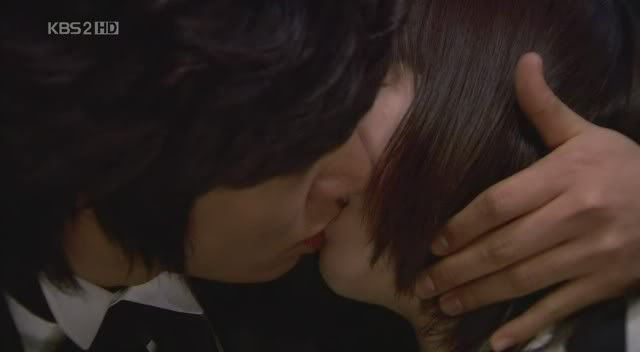 And now, we’re four years later. 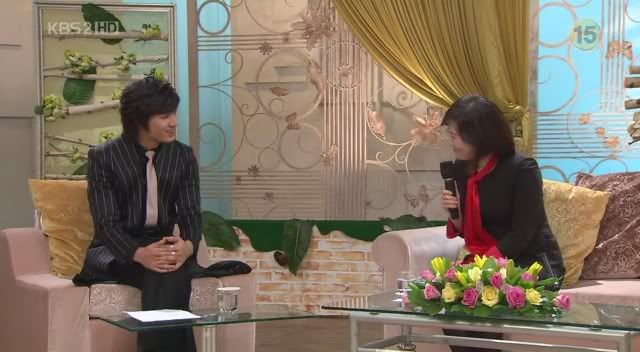 Jun-pyo has made significant progress as a managing director with the company, and is being interviewed on television. While it starts with his business successes, the interview segues into personal questions. Naturally, as a rich, young, handsome chaebol, Jun-pyo’s the target of a lot of crushes and romance speculation. When asked whether there’s anybody in his life to help him through the hard times, Jun-pyo responds, “It would be a lie to say I haven’t had tough times or been lonely. But because of a promise I made with somebody, I drew upon that as support and was able to endure.” 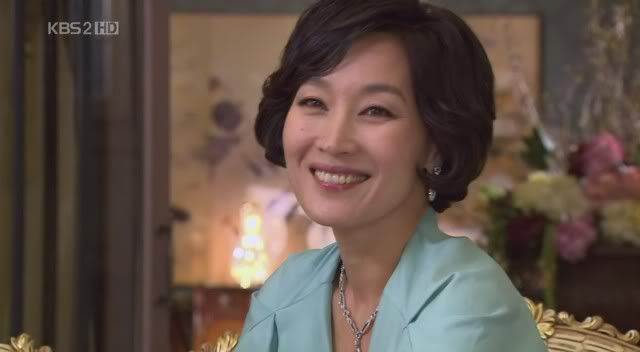 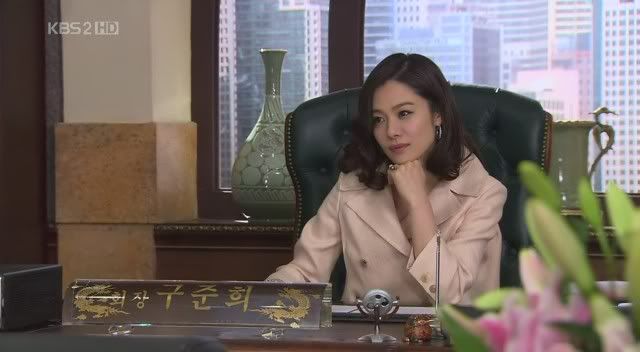 Watching proudly are Jun-pyo’s family — Mama Kang actually shows warmth as she watches alongside her husband, showing him affection that we’d never seen from her. It looks like she’s finally showing the personality that the others have hinted at — the kinder version of herself before she’d become Shinhwa chair. And maybe the biggest surprise in this epilogue is that Jun-hee has now taken over from her mother’s position — she’s the new Shinhwa chair.  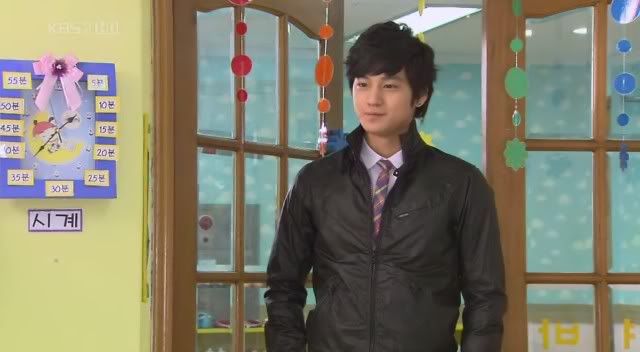 Next up: Yi-jung, who arrives at the airport with dark shades and a swagger. (I’m sorry, Yi-jung being badass just makes me giggle.) True to his word, he heads first to Ga-eul, who is now a teacher. He watches as she leads her young students in a pottery session, then steps in. It’s adorable how one of the little girls looks at Yi-jung and asks, “Ajusshi, did you come from abroad?” He’s surprised that she guessed right, and she follows up, “Did you come from Sweden?” Is he their teacher’s boyfriend? ‘Cause, y’see, Teacher Lady mentioned something about someone in Sweden… A little embarrassed, Ga-eul moves to shut the girl up, but Yi-jung enjoys this proof that she’s been talking about him to her kids. (SO CUTE.) 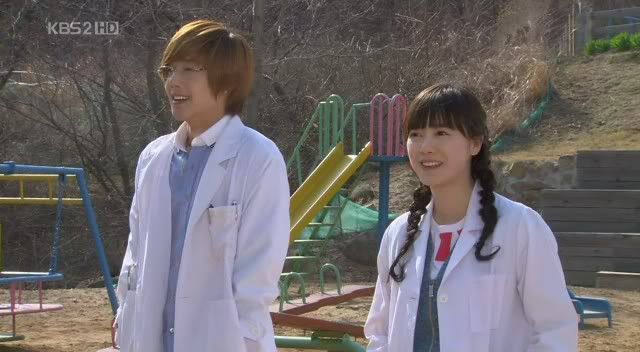 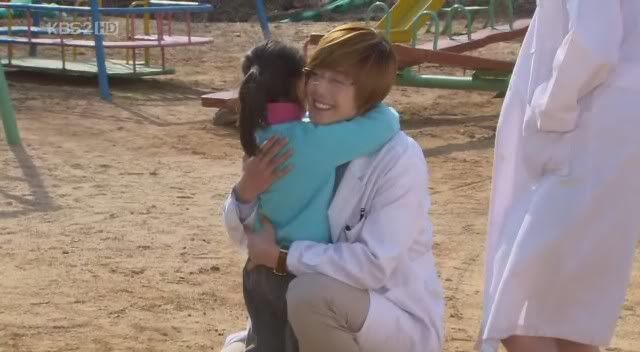 Now, for Jan-di. And, somewhat surprisingly, also Ji-hoo. She is a student at Shinhwa University’s medical school, as is Ji-hoo. As we might expect, Jan-di’s sorta struggling along, klutzy and bumbling as ever, while Ji-hoo is doing very well and about to graduate. Today, they’re on a sort of medical outreach trip. During a break, Jan-di sighs to Ji-hoo about her tough time, and he teases her about failing. 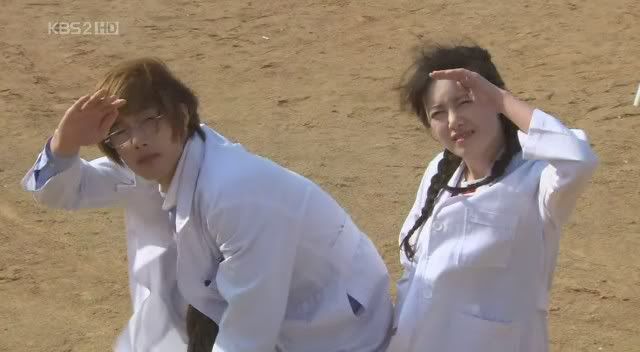 A sudden disturbance interrupts their conversation — a helicopter hovers above, and a familiar voice comes over the loudspeaker. Just like a prior scene when Jun-pyo crashed Jan-di’s working vacation on the fishing boat, he now announces, “Oy, commoner! Can you hear me? Geum Jan-di!” He instructs her meet him at the beach and zooms away. When she arrives at the beach, well, now THIS really is almost paradise! (Yes, I’ll admit it — despite making my ears bleed earlier, I was glad to hear the return of “Almost Paradise” after its extended vacation.) 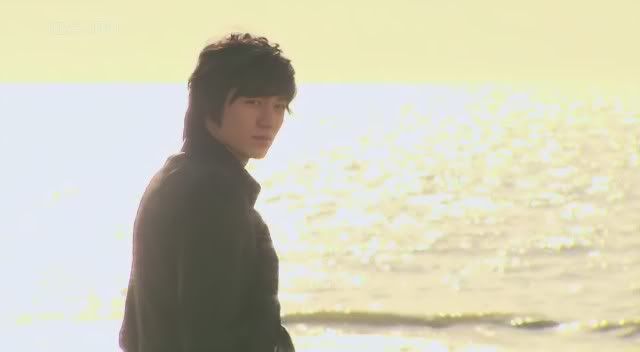 Jan-di approaches with gladness, but a little disbelief to see Jun-pyo here in the flesh . Indicating her white coat, he teases that she looks like “an ugly duckling playing at being the white egret” — another callback to a previous Jun-pyo-ism (he means swan). At that, Jan-di laughs, “It really is you.” Pulling her to him in a hug, Jun-pyo says, “I missed you to death. I’m not letting go again.” 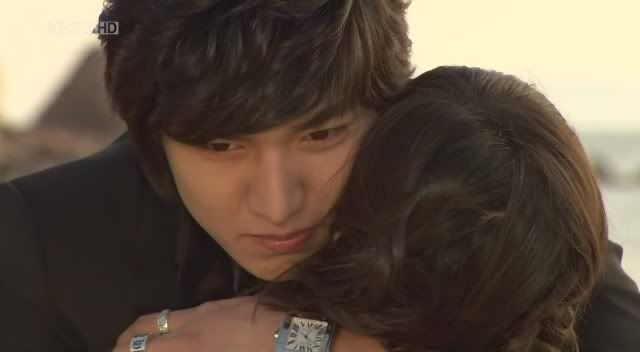 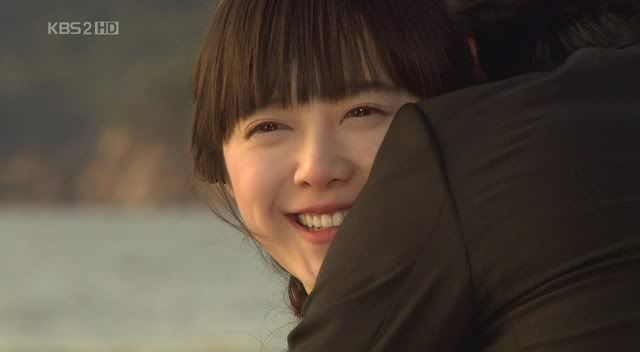 He reminds her that she’d agreed to marry him when he came back. Jan-di returns, “Look here, Dummy Gu Jun-pyo. If you want to get technical, I said when you came back in four years, I’d think about it.” Jun-pyo drops down to one knee, pulls out a ring box, and makes it official: “Geum Jan-di. Marry me.” And of course, at that moment a voice calls out: 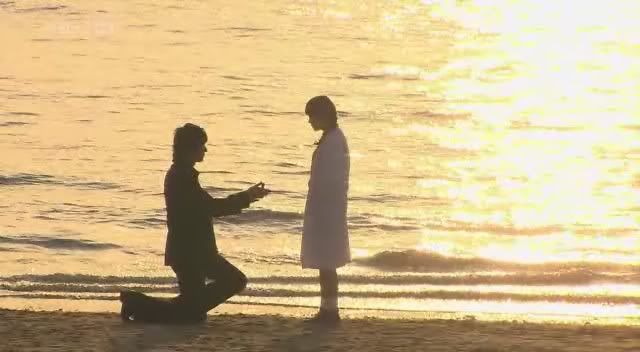 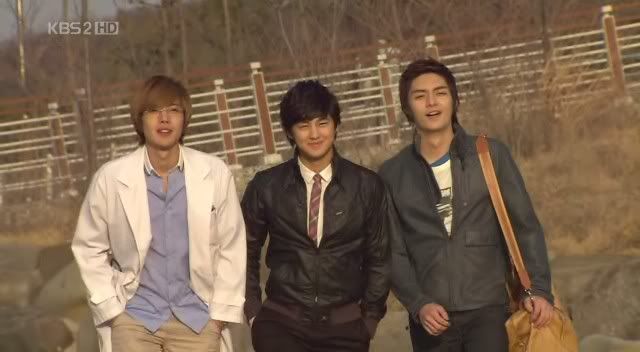 Ji-hoo: “I have an objection to that proposal!” 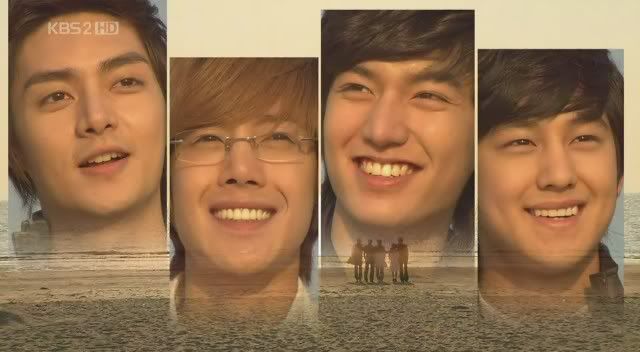 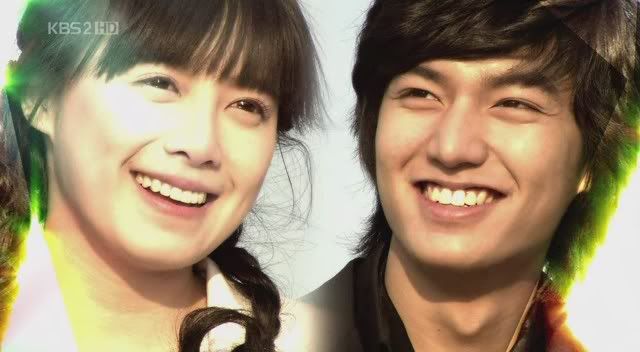 THE END (finally) And, okay, another Song of the Day, just because: Rumble Fish – “사랑해 마지막 그날까지” (I’ll Love You Till My Last Day). If this were a movie, this would be the point halfway through the ending credits where the main song ends and a second song starts up. [ Download ] I’m going to start off with the criticism, because ultimately I was happy with the ending and would prefer to end on an upbeat note. So I’ll pull a “Ga-eul” here and start with the bad: WEAKNESSES (aka, Stuff I Just Let Slide): (1) Madam Kang’s witchy opposition. Poof, gone now? To be fair, I don’t really think it’s a logic flaw, because after Jun-pyo recovers his memory, I take it we are to assume Mama Kang gave up her opposition. It actually does make sense — there’s nothing like contributing to your son’s near-death to give you a wake-up call. But on the other hand, we didn’t see that explicitly, which might give the impression that the Jun-di reconciliation happened too easily, when goodness knows it came anything but “easily.” Not after all those episodes of separation and angst. (2) Dr. Ji-hoo. Uh, but what about The Music? Where did his doctorly pursuits come in? I get that this probably has as much to do with his grandfather as Jan-di, but it felt random. Like it was conjured just to prove again that Ji-hoo is Jan-di’s soulmate, only now it emphasizes that they’re platonic soulmates, since they’ve remained friends even though Jun-pyo’s been away. This leads me to: (3) Soulmates (not to be confused with Soeulmates). I’ve never been a big fan of the “Ji-hoo is Jan-di’s soulmate” aspect. Maybe we’re all conditioned to think that soulmates are a romantic thing, and maybe I resent how much time was overwhelmingly given to the soulmate and not the actual love interest. I think Kim Hyun-joong has improved a lot over the course of the drama, but I still don’t really feel the chemistry between Ji-hoo and Jan-di. The fact that they had SO many sweet, intimate moments throughout the series and I still never jumped ship indicates just how lacking their pairing was for me. (Intellectually, I thought Ji-hoo was better for Jan-di, but I never felt their emotional connection on a gut level, and their interactions never got me excited or giddy or otherwise invested.) 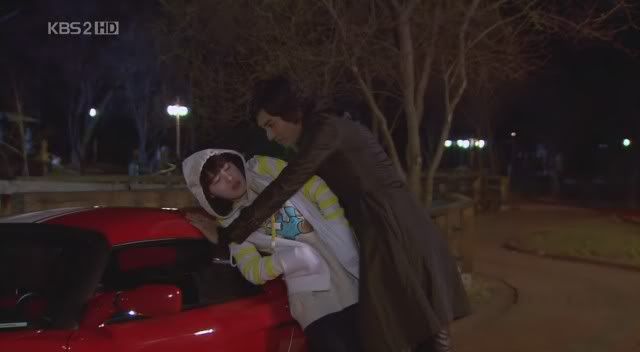 On the other hand: STUFF I LIKED: (1) Callbacks, yay! I enjoyed all the revisited past moments and bits of dialogue that were injected into the finale. I’ve seen dramas do this in the past, but a lot of times they feel forced in. Boys Before Flowers surprised me by doing a good job of incorporating past lines or interactions to build the action here. It didn’t feel like a mere rehash but a natural use of these characters’ personalities. For instance, I liked how all of Jun-pyo’s misstated sayings came back and were worked into dialogue — both in really serious scenes (the pool) and lighter, more upbeat scenes (the cable car, the beach). In some dramas, it feels like characters are suddenly altered/forced into making the ending work, but I like that this was an example of continuity done right. Done wrong, we get blatant fanservice, but done right, it’s pretty emotionally satisfying. (2) The epilogue. The time-skip epilogue is a risky device and is sort of an easy out. Epilogues can be problematic in that they provide a “perfect” wrap-up for characters, kinda like sticking a band-aid over a more serious problem. BUT, in an over-the-top, feel-good romantic comedy like this, I’m all for it. I know there’s no such thing as a true-life Happily Ever After, but this is what I want from a giddy, lovey romance drama. The perfecter the better! An epilogue gives us a little more time to deal with goodbyes, so we avoid the let-down feeling of a resolution that comes too quickly. I would have been sorely disappointed if we ended after the cable-car kiss — and for a few dreaded seconds, I actually thought they’d ended the drama there — but the “four years later” gave us (okay, me) that needed buffer to let myself down gradually. LOL. 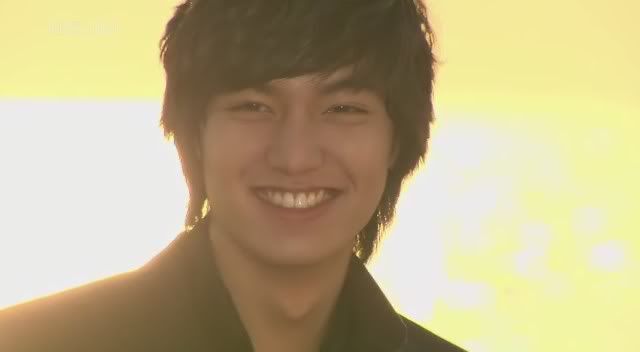 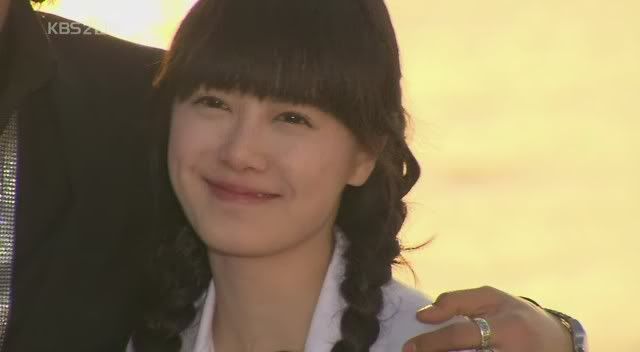 (3) Soeulmates. I expressed my ambivalence about how they would wrap up, but I was pleased with their ending. I don’t think they really needed a huge finish — that would’ve taken time away from the other romance — but I like that we have hope for their future without necessarily seeing it. The time skip works for them because they, perhaps more than Jan-di and Jun-pyo, needed to grow up and live their lives and mature some more before getting together. As much as it might have been romantic for Yi-jung to have made a big gesture at the age of 20, I wouldn’t have the hope for their future that a time skip sorta automatically takes care of. (4) The amnesia fix. Just as I was pleasantly surprised about how the amnesia plot came about, I was pleased at how it played out. Example: The taste thing was one part that was well tied in, because Jan-di made those foods for him in the past, and when she did, they had some significance. The first time Jun-pyo asked for those egg rollups, it was after the snowstorm. It also symbolizes something of their class differences — or rather, emphasizes the “Hey, maybe we’re not so far apart” aspect of their statuses, since Jun-pyo loves this commoner food for what it is, even though he has gourmet stuff all around. (Hey, metaphor!) But I was glad that the taste issue alone wasn’t enough to get Jun-pyo’s memory back. Here’s where the plot diverges from Hanadan, and I was really happy with it — and frankly wished they’d diverged more often. The taste was enough to remind Jun-pyo of his newer, warm-n-fuzzy feelings, but not enough to identify all the details (like, for instance, WHO those warm-n-fuzzies were directed at). That leads Jun-pyo to be chummy with Yumi (grrr), because he’s correlating his memory of Jan-di’s warmth (evoked by her food) with Yumi. I doubt he feels anything for Yumi specifically; it’s more like his wires got crossed so the affection he feels for Jan-di is being misdirected at Yumi. 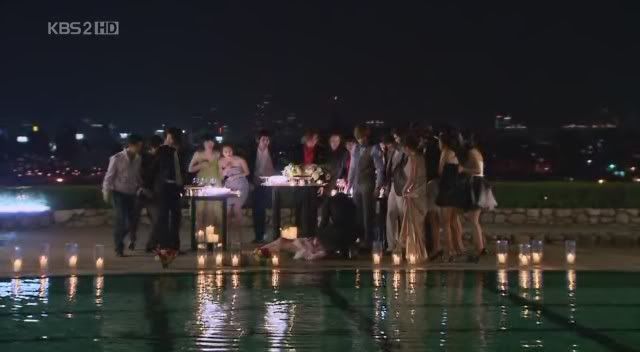 (5) The pool. OH, the awesomeness of the pool! Here’s why I love that Jan-di fell into the water: (a) It proves that despite what she tells Ji-hoo, she still does have faith in Jun-pyo. At first I thought she would merely fake being in “trouble” underwater till he jumped in to save her, but she committed to her last-ditch effort so much that she was really in danger. Was it foolish? Perhaps. But it’s also evidence of how much she believed that he would come around, because even if his conscious memory can’t recall her, she believed in their other connection — that intangible, indestructible love they feel, that connection that’s so strong that forces much stronger than plain ol’ amnesia weren’t able to sever them. (Namely, Madam Kang.) (b) I love Jan-di’s speech to Jun-pyo, because it appears that his selective amnesia (as evidenced by his belief that he can’t swim) has blocked out the past year or so. Any feelings that resemble the Newer Jun-pyo (post-Jan-di) are mostly expressed subconsciously; everything he knows and does consciously is from pre-Jan-di times. So in her speech, Jan-di speaks to the Jun-pyo who changed for/because of her. The things she tells him may not even be things he realizes concretely — they’re things he’s forgotten as well — but as she talks, he feels them resonate. He can try to deny that he knows her, but he can’t deny the truth of her insight into his character, and that scares the bejeebus out of him. (c) And most importantly, Jan-di’s jump into the pool forces Jun-pyo’s subconscious to act. Sure, all throughout the episode, Jan-di (or F3) could have told Jun-pyo the truth of their relationship, but it would’ve done little good to merely announce, “Hey, I’m your girlfriend, you idiot!” Maybe it would have helped, but it wouldn’t have provided the jolt that would return the rest of his memory — not like a good ol’ scare to the subconscious could, anyway. OVERALL THOUGHTS 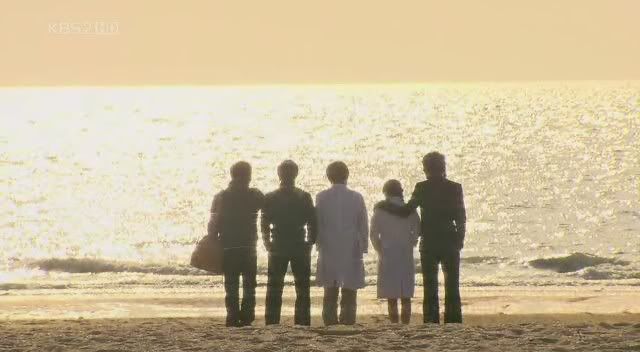 Was Boys Before Flowers a GOOD drama? Well, no. In all honesty, I can’t really call it good — insofar as a “good” drama requires strong acting, masterful directing, tight storytelling, and overall high quality. And it can’t just have one of those elements, but most or all of them, expressed in skillful balance. On the other hand, it depends on how you define the word “good” for yourself. “Good” might not mean “artistic” to you; it might not mean “eloquent” or “insightful.” Good might mean entertaining, or emotionally provocative. Excitement-inducing. Enjoyable to watch and rewatch and participate in fan culture. And in those measures, I’d say BBF delivered. Because sure, an Academy Award-winning film deserves its praise, but to be frank, they’re not always entertaining. Or they may be beautiful and meaningful, but not move the heart. Boys Before Flowers was kind of a glorious mess — the acting was sometimes very good, sometimes horribly bad. The music was decent, but applied carelessly in messy spurts like a five-year-old who’s sneaked her way into mommy’s makeup stash for the first time. The writing had its moments, but more often than not was poorly paced, and as we know you can’t build an entire drama upon random nice moments. But it also had its weird brand of narcotic magic. If you stuck around till the end, you know what I’m talkin’ about. If you didn’t, well, you may still know what I’m talking about, even if you were never under the influence. A film snob may sniff at “the masses” — and I’ve been that person too — but so what? Let the snob enjoy his lofty solitude while we masses can commune with each other and laugh and cry together. I was actually reading a book somewhere around the middle of BBF’s run, and a paragraph leapt off the page and just about smacked me in the face with its aptness. And who can argue with the words of the (late, great) awesome David Foster Wallace? “At root, vulgar just means popular on a mass scale. It is the semantic opposite of pretentious or snobby. It is humility with a comb-over. It is Nielsen ratings and Barnum’s axiom and the real bottom line. It is big, big business.”Truer words, y’all. 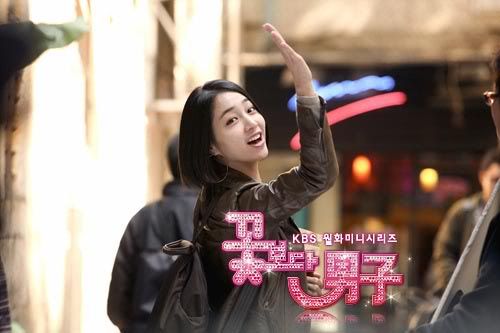 I’ve had SO MUCH FUN, you guys! I think the drama has reached its time to go, so I’m not sad that the series is over, but I will miss the insanity of this drama. All the discussion, the fangirling (myself included), the plot dissection, future predictions, kvetching about story insanity, snarking about ridiculosity, and yes, even bitching about everything that drove us crazy. Honestly, I haven’t been this entertained following a drama in a while. True, in a vacuum, this product itself is far from perfect — but thankfully, I don’t consume my entertainment in a vacuum, but out here in the wilds of the internet as part of an enthusiastic community. THANKS FOR ALL THE FUN TIMES! |
Sunday, January 09, 2011
Boys Before Flowers: Episode 25 (Final)
Subscribe to:
Post Comments (Atom)

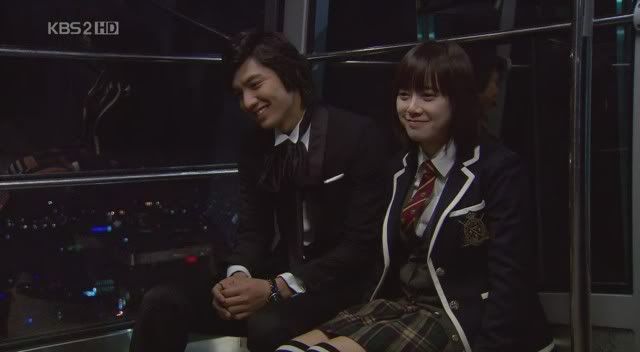
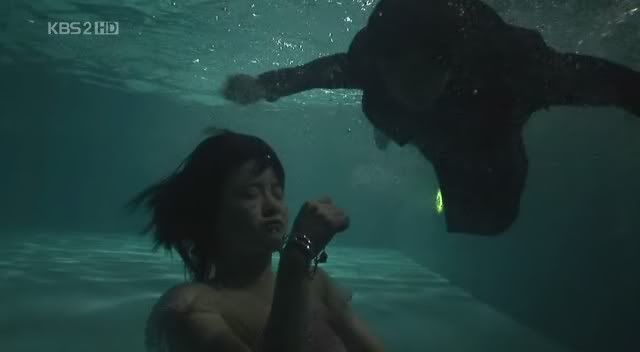
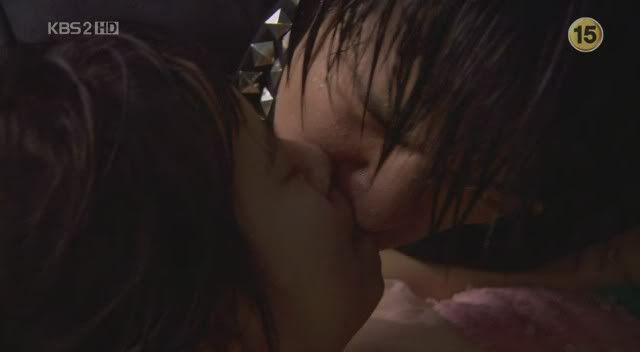
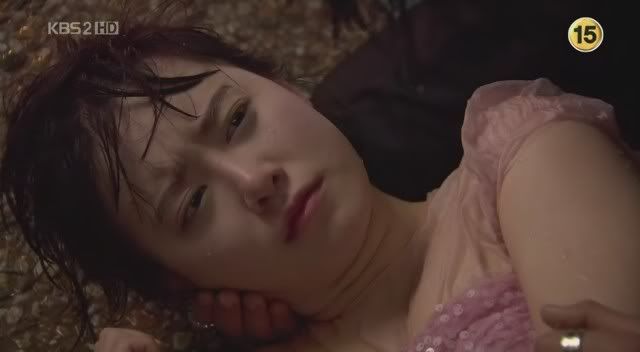

No comments:
Post a Comment